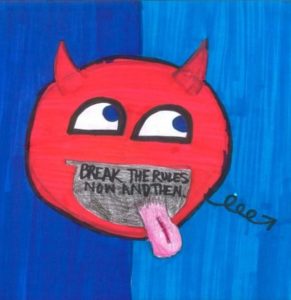Legend has it that Ernest Hemingway was once challenged to write a story in only six words. His response was this; “For Sale: Baby shoes. Never worn.”
Back in November 2006, SMITH Magazine asked readers to send in their own Six-Word Memoirs. They were meant to be short life stories which would be shared in the publication. So many people responded that the Six-Word Memoir project formed and grew wings. Stories have ranged from the bittersweet (“Cursed with cancer, blessed with friends”) and poignant (“I still make coffee for two”) to the inspirational (“Business school? Bah! Pop music? Hurrah”) and hilarious (“I like big butts, can’t lie”).The Six-Word Memoir project has become a global phenomenon and a bestselling book series. Six-Word Memoirs have been featured in hundreds of media outlets from NPR to The New Yorker and covered on tens of thousands of blogs. Hundreds of thousands of people have shared their own short life story as well as in classrooms, churches, and at live Six-Word “slams” across the world.
I have used the Six-Word Memoir project in counseling groups and as an interactive presentation for over a decade. Initially, I used it as an icebreaker but soon it became a powerful tool to inspire and encourage conversations which get to the bottom of how kids (and adults for that matter) are experiencing their lives. They disclose in six words what might have been impossible otherwise.Larry Smith recently published a book called Things Don’t Have to be Complicated: Illustrated Six-Word Memoirs by Students Making Sense of the World, published with TED Books, a division of the TED Conference. It would be a great resource for any School Resource Officer who will be making presentations to student groups (both small and large).
Kind of Group: Experiential
Group Size: 4 to Classroom Size
Purpose of Group: Team building; Community building; Relationship building; Developing individual insight;This is how it works:
Write your own Six-Word Memoir or story on the black board or white board.
When the kids have settled in, read the words to them and ask what they might think the story means.
Ask the group this question; “Can you tell your life story in six words?” Provide examples of memoirs. Some people ask the kids to add drawings to illustrate them.
Other examples are:
Not quite what I was planning
My life made my therapist laugh
The psychic said I’d be richer
Bad brakes discovered at high speeds
My happily ever after is now
Ask the kids to create their own Six-Word Memoir. Allow about ten minutes. They can sign their names or leave the work anonymous. Some folks have kids make a Six-Word YouTube video.
Your Life. Six Words.
Six Word Memoirs written by my seventh grade students at Franklin Delano Roosevelt Middle School during my student teaching experience.
Steps to writing a Six-Word Memoir (Student Directions)
Instruct the kids saying: “To narrow down your memoir to six words…start with many”
Start with a list. Take three minutes to write as many words as you can about yourself. List things you like, things you think and things you feel. Don’t worry about spelling. Don’t erase or cross out. Go for quantity. Just write. (examples; friend, happy, silly, hip-hop, sleepy, bored, band nerd, jock, secrets, girls, girls, girls, dinosaurs…)
Now circle two or three words that stand out for you. The ones you could say more about. (example from the list; silly, bored, girls)
Pick one of the three and freewrite about it. In other words, just start writing about it…Whatever comes to your mind. Don’t stop writing for about two minutes. (an example of freewrite; “I love to get silly and make people laugh. Sometimes I do it in class and get in trouble but I don’t care. One time I fell out of my seat when I tipped it backward and hit my head on Gina’s desk. Everyone went hysterical. I could be a comedian. It makes people like me”.
Simplify and synthesize the Freewrite. (example from above; My topic is “silly”. My idea is “Being silly makes me happy and popular no matter what the consequences are”).
Develop my Six-Word Memoir: “Silliness is crazy. Love me yet?”
Now ask if anyone wants to share their memoir.
Process and seek feedback from the group on any of the shared memoirs with their permission
Congratulate the kids on their work and collect the papers completed by students. Then pick three or more of the collected memoirs and read them. If they have been signed ask the student for permission to read before doing so. Process as in step 6.
Close the group by offering to meet with anyone who wants to talk about their memoir. Lighten the mood with a Six-Word Closing like;
This was cool. See ya later
Be a star. You already shine
There is a lot that can be done with the memoirs you will collect. By all means keep them. One thing is certain. Everyone will have been uplifted and will have gained some insight.
Robert Kenneth Jones is an innovator in the treatment of addiction and childhood abuse.In a career spanning over four decades, his work helping people recover from childhood abuse and addiction has earned him the respect of his peers.His blog, An Elephant for Breakfast, testifies to the power of the human spirit to overcome the worst of life’s difficulties. We encourage you to visit and share this rich source of healing, inspiration and meditation.
Contact Bob Jones on Linkedin
Bob Jones’ blog An Elephant for Breakfast



